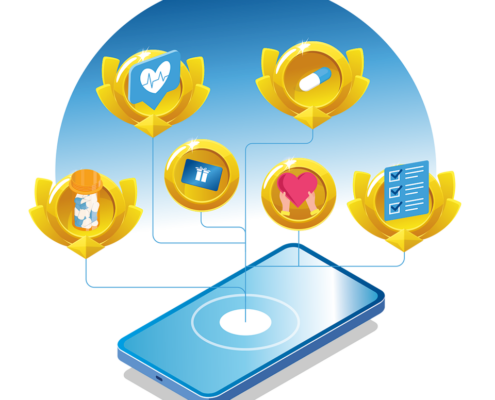Earn Points
HealthPrize offers patients many ways to earn points which are then redeemable for a variety of rewards, including gift cards, charitable donations, and health and wellness offerings, as approved by each pharmaceutical brand.
For the past 10 years, HealthPrize has partnered with pharmaceutical brands to develop patient support programs using gamification, behavioral economics and loyalty marketing best practices to increase medication adherence and improve clinical outcomes.
Based on high engagement and significant increases in refill rates, these programs have been successful in impacting patient adherence. While HealthPrize programs have been implemented across a wide diversity of chronic conditions, including diabetes, hypertension, chronic obstructive pulmonary disease (COPD), asthma and acne, there is one major disease category for which industry hesitation has prevented patients from participating: oncology.
HealthPrize programs are easy to implement, integrate, activate and operate, and no devices or downloads are required for members to participate.
 Although medication adherence rates may be higher, generally speaking, in oncology compared to other common primary care conditions such as hyperlipidemia and hypertension, nonadherence is well documented to be a problem that compromises clinical outcomes across a number of cancer diagnoses. Clearly, oncology represents a wide spectrum of disease, and programs such as HealthPrize are not appropriate for certain diagnoses or in the acute or end-of-life phases of treatment. But nonadherence is definitely a factor—and HealthPrize is perfectly appropriate we believe—in the more chronic forms of selected cancers.
Although medication adherence rates may be higher, generally speaking, in oncology compared to other common primary care conditions such as hyperlipidemia and hypertension, nonadherence is well documented to be a problem that compromises clinical outcomes across a number of cancer diagnoses. Clearly, oncology represents a wide spectrum of disease, and programs such as HealthPrize are not appropriate for certain diagnoses or in the acute or end-of-life phases of treatment. But nonadherence is definitely a factor—and HealthPrize is perfectly appropriate we believe—in the more chronic forms of selected cancers.
For example, it is well understood that patients on adjuvant oral therapy to prevent breast cancer recurrence and patients requiring years—or even decades—of treatment for chronic myeloid leukemia (CML) struggle to achieve perfect adherence rates for a variety of reasons. (In the case of breast cancer, many patients even demonstrate non-persistence, quitting adjuvant therapy altogether before the recommended five years.) And although 100% adherence is an unrealistic goal for any patient with any condition, most experts would agree that in oncology an adherence rate of 80% is not a sufficient target as may be the case with a statin.
Given that better adherence means better drug efficacy and treatment success, programs designed to push adherence closer to 100% in oncology can contribute to increased survival and quality of life.
At HealthPrize we believe that human psychology is often at the root of nonadherence, including in oncology. Especially in the chronic phase, for some patients the medication serves as a negative reminder of their status as a cancer patient, just at the point when they’d like to forget. For others, a sense of complacency may set in, causing a natural present bias to dominate (a focus on the present to the detriment of our future health), similar to what is seen in other silent conditions like hypertension.
Hesitation on the part of brand managers to adopt a rewards-based adherence strategy in oncology has been based mainly on the opinion that such a fun approach is not appropriate for such a serious illness. And although we always agree, of course, that all cancer is serious, we have asserted our opinion that the most important stakeholder would probably welcome a little more fun in the chronic management of their condition: the patient.
 To confirm our assertion, we partnered with WEGO Health to reach patients within the cancer community. With a network of more than 100,000 patient influencers and thought leaders, WEGO Health works with life sciences companies on the development and execution of digital marketing and social promotion campaigns that are designed to drive awareness of new therapies, treatment options and support programs for patients and caregivers. Much of WEGO Health’s success in is a function of working in close collaboration with patients to glean actionable insights that can inform the focus and messaging strategy for these outreach campaigns.
To confirm our assertion, we partnered with WEGO Health to reach patients within the cancer community. With a network of more than 100,000 patient influencers and thought leaders, WEGO Health works with life sciences companies on the development and execution of digital marketing and social promotion campaigns that are designed to drive awareness of new therapies, treatment options and support programs for patients and caregivers. Much of WEGO Health’s success in is a function of working in close collaboration with patients to glean actionable insights that can inform the focus and messaging strategy for these outreach campaigns.
Via WEGO Health’s smartphone-based Truvio platform, ten patient influencers were engaged in the following way. Each patient received descriptions and screenshots of various elements of a generic HealthPrize program and were asked about the appropriateness of such an approach for themselves and their cancer community. Their answers were collected via anonymous voice response. Here, we present the diversity of their insights. While the majority of responses were positive toward the HealthPrize approach, in fairness, we will also share the concerns that these patient influencers raised.
As with any digital strategy—adherence or otherwise—designed for the patient, not all patients will be able or willing to participate. This point was raised by a few of our patient influencers. In particular, they called out elderly patients as less likely participants.
These are certainly valid concerns, although not unique to HealthPrize. That said, we all have older family members and friends who have embraced not only digital technology but also gaming like Candy Crush and online Solitaire. Clearly there is a spectrum of digital savvy and interest across the age range.
Similar to what we have found across existing HealthPrize programs, different elements of the platform appeal to some patients and not to others. This difference of opinion tends not to compromise engagement or efficacy, however, because participants can choose to focus on their favorite elements and ignore others.
The leaderboard is a perfect example. Some users love the competitive element; those who tend not to thrive on competition may choose to ignore it. Here are two contrasting opinions along those lines.
We believe that the multiple behavioral levers and engagement tools that our programs offer—self-reporting for points, refilling on time, weekly quizzes and surveys, daily tips, leaderboards, streaks—work in synergy to contribute to its success. However, not every patient needs to engage in every element for the program to be effective.
One patient influencer raised an important point that is particularly relevant in oncology: where a patient is along their cancer journey may influence their interest or lack of interest in such a program. Consider breast cancer, for example. Month One of adjuvant therapy likely induces a different mindset and experience than Year Two.
Consideration of the patient journey is a built-in priority of HealthPrize programs, particularly asit relates to the content presented in daily tips, weekly quizzes and weekly surveys. For each chronic condition, we craft the dynamic content in partnership with the pharmaceutical brand to ensure that patients earlier along in their treatment and in the program receive the most relevant content at that stage of their journey.
We were eager to find out how our patient influencers would respond to the objections we sometimes receive from the pharmaceutical industry when it comes to offering HealthPrize to the cancer community. We asked the patient influencers: “What would be your response to a pharmaceutical executive saying: ‘Programs like HealthPrize may not be appropriate for cancer patients because cancer is more serious than other conditions such as hypertension and diabetes.’” Their responses were illuminating and will serve as inspiration for us to redouble our efforts to partner with oncology brands.
First, a couple of patient influencers made the point that it’s even more important to offer such programs to cancer patients as compared to patients with other chronic conditions:
Others made a related point that we feel is critical to the HealthPrize approach, which is that all patients are people first, regardless of medical condition, and that people tend to respond well to a more positive and engaging approach:
Interestingly, one of the patient influencers did agree with the fictional pharmaceutical executive’s statement, perhaps as testament to the diversity of cancer diagnoses, with some diagnoses understood to be more “serious” than others. But this opinion stands in opposition to the excerpt that immediately follows from a different patient influencer. Such diversity in point of view reflects the obvious need to consider programs on a case-by-case basis depending upon disease specifics and the affected patient population.
Fundamentally, a HealthPrize program functions as an engagement engine, and so it was gratifying to see that some patient influencers emphasized the simple point that earning rewards just for participating would be a positive experience—a reminder of what patient engagement is all about.
Those sentiments are at the heart of what HealthPrize promotes: patient participation as the key to driving better medication adherence and, ultimately, better outcomes. As a result of these expert patient panel opinions, we are now more motivated than ever to partner with oncology brands to bring the benefits of HealthPrize to this important patient community.
And we think that would be wonderful.